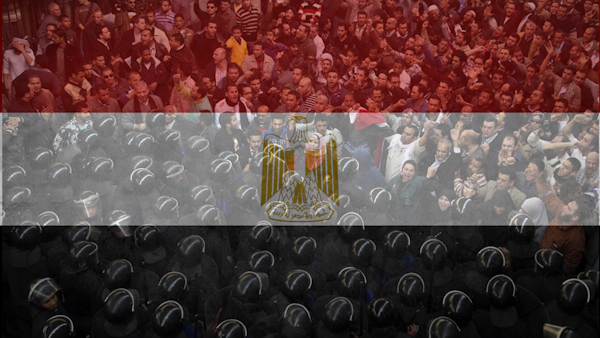Photo by: Will Gentry
Violent protests are spreading across Egypt as liberal and conservative Islamists clash with the Muslim Brotherhood and President Mohammed Morsi. The week of rioting left up to 60 people dead throughout the country.
Cairo, Alexandria on the Mediterranean, Port Said, Ismailiya, Suez and other cities to the north and south of the capitol are participating in this revolt. Protestors have cut off roads and railways, besieged government offices and clashed with police forces.
The Muslim Brotherhood planned to spend the second anniversary of Egypt’s 2011 revolution by helping millions of hospital patients and renovating schools. Instead they are experiencing déjà vu with tear gas, marches and shouts to topple the regime.
Jan. 25, 2011 began the Egyptian Revolution of 2011. Millions of protestors gathered and demanded the overthrow of the regime of President Hosni Mubarak. The protest was filled with demonstrations, civil disobedience and labor strikes. Issues contributing to the 2011 revolution included low wages, police brutality, free elections, freedom of speech, corruption and state of emergency laws.
The 2011 Revolution became known to some as “Revolution 2.0,” since social media both sparked and accelerated the revolt. Facebook was a means of organizing it, and Twitter spread the news globally. “#jan25” was a trending hashtag on Twitter.
What shocked observers was the speed with which the regime fell — after only 18 days, Mubarak resigned. On June 30, Mohammed Morsi was elected the fifth president of Egypt. Two years later, the citizens are having the same reaction to Morsi.
Many are drawing strong connections between the 2013 riots and the rebellion in 2011, which left seven thousand people injured or dead.
Associate Professor of Political Science Raymon Huston discussed the cause of the new revolts.
“Dissatisfaction with the way the last rebellion turned out,” said Huston. “You have a three-sided war in Egypt. You have the military and the Mubarak supporters; then you have the Brotherhood, and you have the liberal secularists — those who want to be like the West.”
The riots portray a government that is inattentive and untrusted. Two years of different leadership and seven months of the Muslim Brotherhood have not brought about the desired change and instituted accountability.
“One of the interesting things about stuff like this is that if after the first revolution a strong government isn’t established, it’s almost predictable that something will happen again,” said Genesis Rodrigues, a senior political science major and president of Oklahoma Christian’s Model Arab League
In the seven months Morsi has been in office, there have already been 24 lawsuits filed against activists and journalists.
“During [Morsi’s] campaign, he decided to pledge one thing and do another,” Huston said. “He promised freedom, but he pushed a constitution that was extremely vague. It gave the president a lot more power while seemingly less, and it didn’t protect anyone’s rights.”
The National Salvation Front, the main opposition, is demanding that Morsi rewrite controversial parts of the constitution and create a more unified government.
“A lot of country and independent analysts have said the constitution was hastily written and fails to address a number of very relevant issues to the Egyptian people,” said Christian Asbill, a junior political science major. “Particularly on issues of individual rights, the role of Islam in the new law.”
Sunday night, Morsi addressed the issue in a short but piercing speech, where he put a 30 day emergency curfew on three Suez Canal providences that have been hit the hardest with violence.
“The Egyptian people are seeing that in the time since Mubarak was overthrown they haven’t really gotten anywhere, and this new government isn’t going to do anything better,” Asbill said. “I wouldn’t necessarily say it’s a new round of protests; rather, it’s a continuation of previous ones.”
Events have escalated quickly, with Egyptian youths throwing petrol bombs and fireworks at the outside of Morsi’s presidential compound. Police responded with tear gas and water cannons. Other places, police have fired on protestors, killing innocent bystanders. Some are now demanding that Morsi, as his predecessor was, be tried for the death of these citizens.
The riots and deaths lead to the question: could Egypt collapse?
President Morsi is currently unconcerned with the extreme measures his citizens have taken.
“What is happening now in Egypt is natural in nations experiencing a shift to democracy,” Morsi told reporters in Berlin.
Israeli army chief and defense minister Gen. Abdel-Fattah el-Sissi has a dissenting opinion, however. He believes that the state could be on the brink of collapsing, and Huston agrees.
“It already has collapsed,” Huston said. “Mubarka was the only thing that was holding it together. You’re essentially having tribal warfare, like in Sudan. But instead of tribes and tribal leaders, you have political parties and religious affiliations.”
The White House faces a bit of a dilemma. Previously, they had hoped to ease relations between the United States and the brotherhood, yet with the wave of protests and Morsi’s comments calling Jews “pigs” and “blood suckers” surfacing, the U. S. is in a predicament on whether to support one side, be a mediator or stay out.
“The United States is interested in fostering a good relationship with the people of Egypt,” Asbill said. “At the same time, we have an alliance with Israel, and a precedence of defending Israel and Israel’s actions. The most diplomatic action would be for the U.S. to stay out.”
The Egyptian government has been attempting to subdue the rebellion, but they are dealing with a people who have now found their voice.
“It’s going to be a battle ground,” Huston said. “It’s going to be a fight. I don’t think ultimately the Brotherhood will win out, but what you’re probably going to end up with is another dictator.”












Be First to Comment